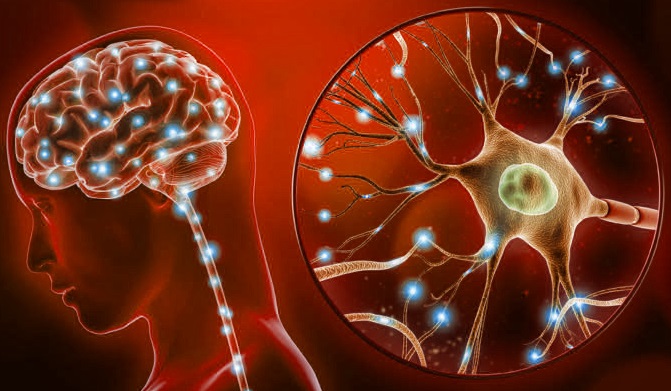Nikhil Prasad Fact checked by:Thailand Medical News Team Feb 17, 2025 1 month, 3 weeks, 3 days, 8 hours, 9 minutes ago
Medical News:
Understanding How Retinoic Acid Influences Brain Cells
A groundbreaking study by researchers from the University of Pisa and IRCCS Neuromed in Italy has uncovered how retinoic acid (RA), a compound derived from vitamin A, helps immature nerve cells develop into mature neurons while simultaneously enhancing a vital cellular process known as autophagy. This
Medical News report delves into the study’s findings, highlighting their potential implications for neurodegenerative diseases and brain health.
 Retinoic Acid Boosts Neuron Growth While Enhancing Cellular Cleanup
Retinoic Acid Boosts Neuron Growth While Enhancing Cellular Cleanup
Retinoic acid (RA) has long been known for its role in neural development, but this new research reveals a fascinating connection between RA-induced neuron growth and an increase in the cellular cleanup process known as autophagy. Autophagy is responsible for breaking down and recycling damaged proteins and cellular waste, ensuring that cells remain functional and healthy.
The Role of Retinoic Acid in Brain Cell Development
The researchers conducted their study using SH-SY5Y cells, a commonly used model for studying human nerve cell development. When these cells were exposed to retinoic acid, they underwent significant changes, transforming from immature neuroblast-like cells into more mature, neuron-like cells. This transformation was evident in the elongation of their structures and the increased presence of key neuronal markers such as βIII-tubulin and NeuN.
Notably, the study found that retinoic acid interacts with specific receptors in the cell nucleus, triggering a cascade of genetic changes that promote neuronal differentiation. This process is crucial for brain development and repair, and understanding it may open new doors for treatments targeting neurological disorders such as Parkinson’s disease and Alzheimer’s.
Retinoic Acid and Autophagy Work Together
One of the study’s most significant findings was that retinoic acid not only promotes neuronal differentiation but also increases autophagy-related activity in cells. Researchers measured the presence of key autophagy-related proteins, such as Beclin 1 and LC3, and found that their levels increased when retinoic acid was introduced. These proteins play essential roles in forming autophagosomes, specialized compartments within cells that break down and recycle damaged components.
The researchers compared the effects of retinoic acid treatment to those of starvation, another well-known trigger of autophagy. While both retinoic acid and starvation enhanced autophagy, prolonged starvation led to cell damage and death, whereas retinoic acid-supported cells remained viable and continued to differentiate into neurons. This suggests that retinoic acid provides a balanced approach to promoting autophagy without causing harmful effects.
The Importance of Cellular Cleanup in Brain Health
Autophagy is vital for maintaining cellular health, particularly in the nervous
system, where damaged or misfolded proteins can lead to severe disorders. Diseases such as Parkinson’s and Alzheimer’s are often linked to dysfunctional autophagy, where harmful protein accumulations interfere with normal brain function.
This study suggests that retinoic acid could play a crucial role in maintaining brain health by ensuring that neuronal cells not only grow properly but also stay clean and functional. By enhancing autophagy, retinoic acid helps neurons clear out potentially harmful debris, reducing the risk of cellular stress and neurodegeneration.
Autophagy Inhibitors and Enhancers in the Study
To further understand the relationship between retinoic acid and autophagy, researchers tested how the presence of autophagy inhibitors and enhancers affected retinoic acid-induced neuronal differentiation. They found that when autophagy was blocked using a substance called 3-methyladenine (3-MA), retinoic acid’s ability to promote neuron growth was significantly reduced. Conversely, when autophagy was enhanced using rapamycin, the effects of retinoic acid on neuronal differentiation were amplified.
These findings indicate that autophagy is not just a secondary effect of retinoic acid treatment but a necessary process that actively contributes to neuron formation. Without autophagy, retinoic acid’s full potential in developing healthy neurons cannot be realized.
Future Implications for Neurological Research
The study highlights the need for further exploration into the potential of retinoic acid-based therapies for neurodegenerative diseases. By understanding how retinoic acid interacts with autophagy, scientists may be able to develop treatments that promote healthy neuron growth while preventing the buildup of toxic cellular waste.
If retinoic acid can be harnessed to safely stimulate autophagy in the brain, it may provide a new therapeutic strategy for conditions where protein accumulation and neuronal death are key features. This includes not only Alzheimer’s and Parkinson’s disease but also conditions like Huntington’s disease and amyotrophic lateral sclerosis (ALS).
Conclusion
The study findings provide compelling evidence that retinoic acid promotes neuronal differentiation while simultaneously enhancing autophagy. This dual effect could have profound implications for brain health, offering potential avenues for new treatments targeting neurodegenerative diseases. By supporting both neuron growth and cellular cleanup, retinoic acid may serve as a valuable tool in preserving cognitive function and preventing the progression of disorders associated with aging and neuronal decline.
The study findings were published in the peer-reviewed International Journal of Molecular Sciences.
https://www.mdpi.com/1422-0067/26/4/1691
For the latest on retinoic acid, keep on logging to Thailand
Medical News.
Read Also:
https://www.thailandmedical.news/news/the-neurobiological-link-between-sleep-glymphatic-dysfunction-and-neurodegeneration
https://www.thailandmedical.news/news/covid-19-causes-glymphatic-drainage-dysfunction-and-bbb-disruption-that-contributes-to-neuroaxonal-injury
https://www.thailandmedical.news/news/breaking-covid-19-news-study-alarmingly-finds-that-recovered-individuals-who-only-had-mild-covid-19-exhibit-glymphatic-system-dysfunction
https://www.thailandmedical.news/pages/thailand_doctors_listings
Follow us on:
https://x.com/ThailandMedicaX
https://www.facebook.com/ThailandMedicalNews
https://bsky.app/profile/thailandmedical.bsky.social
https://gettr.com/user/thailandmedicalnews
https://www.tribel.com/thailandmedical/wall
